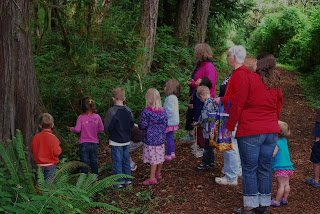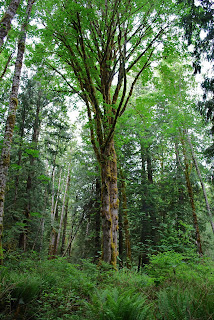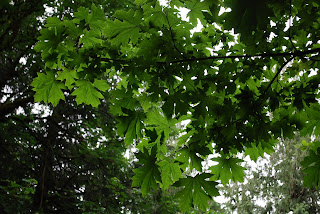We all wondered just what would happen, every last one of us. Standing there on the forest trail, the ten kiddos, some with their moms, watched intently as I gently removed him from the jar and placed him on a nearby leaf. Would he remain there, unsure of what to do now that he was free? Perhaps he was exhausted from the week in captivity and was unable to fly. Or maybe he was just taking his time and getting his bearings. It must have been the latter, as he only rested a brief moment before he lifted off and quietly fluttered up, up, and off between the trees toward the lake. "Bye, Bye, moth; we wish you well - go find a lady friend!"
So approached the end of the saga of the Single-eyed Sphinx moths, which began at this very camp and around this very time one year ago. Encouraged to find and catch all kinds of creepy-crawlies to observe and learn about, one girl gleaned the beautiful large female of this species, which promptly laid eggs and died. Although it certainly was not planned, I ended up raising the tiny caterpillars that hatched from those eggs a week later, after I'd returned home. It was not a difficult task, but did involve picking a great many willow leaves, cleaning up the aftermath of all that eating, and carrying those quickly-growing horn worms into Sunday School a few times to share with the children. Some of them had been at camp and were curious to see what was happening with the offspring of that huge moth. We really had no idea where it would all lead...
(To read the process of raising these moths,
see Caterpillar Summer.)
Only they really weren't - out of mind, that is. For it had always been my intention to share the results, whatever they were, with those kids at camp the next year. During the long winter and equally cold, wet spring, every once in a while my mind would wander up into the loft where I wondered what could be transpiring. Had they eaten enough to mature to the point they needed to as caterpillars? We had, after all, left town for two weeks in September, trusting that the willow twigs we'd left them with would be enough to tide them over until we returned. Was there enough soil to protect them from freezing? When should I bring them down and begin to watch for their hoped-for emergence?
Spring this year was cold and wet - unusually so, I think. Finally, near the beginning of June, I fetched the terrarium and set it on the side porch where I could keep an eye on it. I had no idea when they might emerge, if at all... research on the web only offered rough estimations, depending on where one lived. Near the end of June, I removed the lid - we were due to leave for a vacation and I did not want the moths to emerge only to beat themselves to death trying to escape.
Returning home after a few weeks, there was no sign that anything had changed. We replaced the lid and hoped for the best, knowing full well that any moths that may have developed were long gone. Family Camp was only two weeks away!
The moths went to camp. Exhilarated with the release of the first one, I repeated the procedure with the second one with a larger group of older kids. We all oohed and aahed as he fluttered off into the woods and I turned to lead the troops down to the lake, so I did not witness the final ending to this story. As the moth fluttered away, a Robin swooped down and snapped him up in mid-air! Tasty morsel that it was, I'm sure that Robin had no idea of the treasure she stole... but then again, she also needs to survive.
I only play in this game called Life - I don't make the rules.
Who provides for the raven its prey,
when its young ones cry to God,
and wander about for lack of food?
Is it by your wisdom that the hawk soars,
and spreads its wings toward the south?
Is it at your command that the eagle mounts up
and makes its nest on high?
Job 38:41 & 39:26-27
Look at the birds of the air,
they neither sow nor reap nor gather into barns,
and yet your heavenly Father feeds them.
Are you not of more value than they?
Matthew 6: 26
As of this writing, one more male moth has emerged and has been released at night to give him some chance of survival. Guess the saga hasn't ended yet... stay tuned.















































